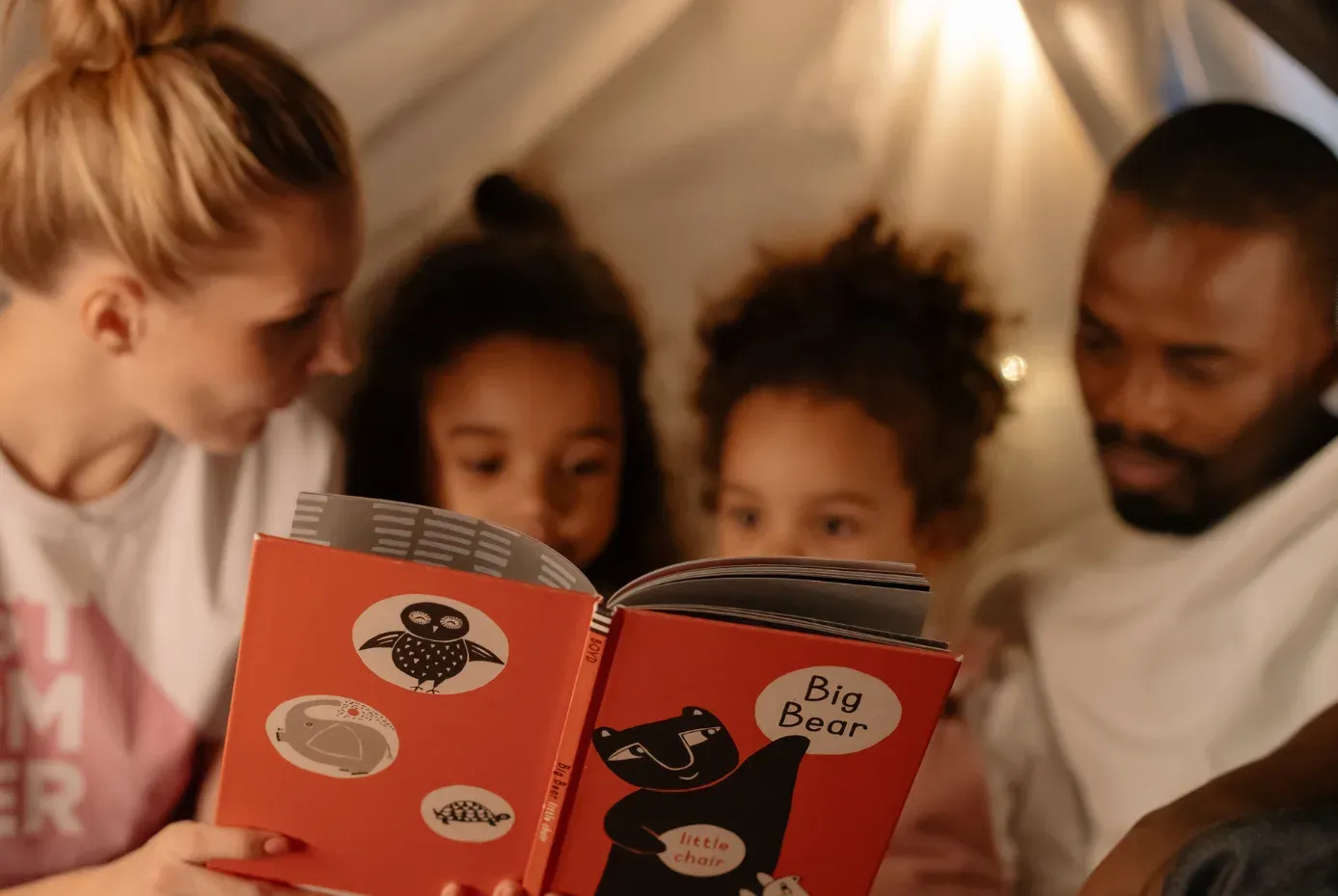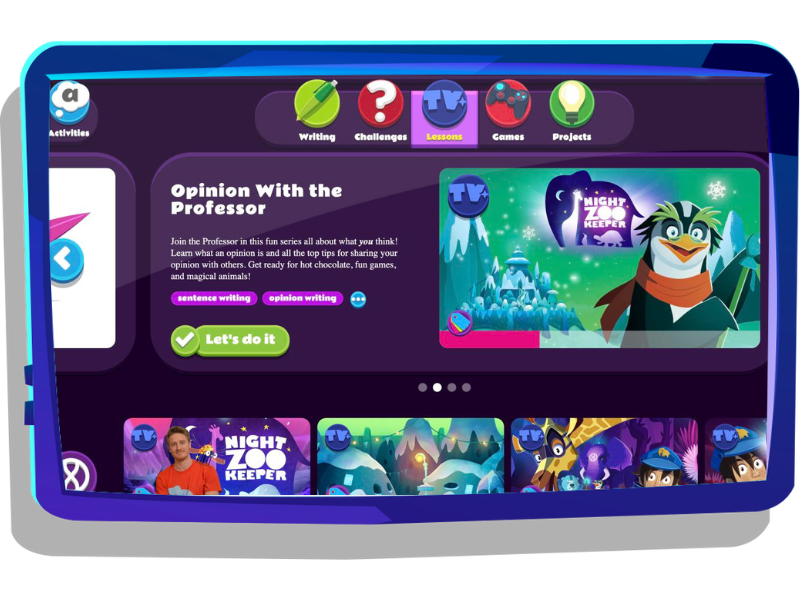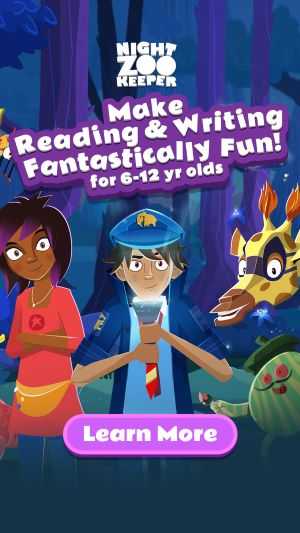Year 5 Writing
Discover Year 5 writing standards

Home > English > Writing > Year 5
Year 5 writing requires children to be confident with all the fundamental English language skills. They should now have a strong foundation in spelling, grammar, punctuation, and reading comprehension, and should also be broadening their vocabulary with ease.
Now is the time for learners to make a leap towards writing articles where they display critical and creative thinking skills, whilst writing with a pace and fluency to interest and excite their reader. This is a difficult leap for most children to make, so it’s important that you provide your child with plenty of opportunities to practise and hone their writing skills.
Here are some ways you can ensure your child’s writing progression in Year 5:
- Create a permanent writing station at home where your child can write whenever the inspiration grabs them.
- Encourage reading whenever possible. Your child will pick up invaluable tips and tricks from other authors.
- Model good writing habits. You can sit down and write a story alongside your child and then read your drafts to one another.

Here are 10 key aims for Year 5 students to keep in mind:
- Write a strong narrative with a clear structure.
- Use a broad range of interesting and technical vocabulary.
- Write informative articles and express clear opinions in their work.
- Use parts of speech accurately, such as adverbs, conjunctions, adjectives, and pronouns.
- Write with a clear purpose.
- Complete research projects and insert key facts into their articles.
- Understand the key differences between writing styles (Opinion, Narrative, Informative).
- Write clear introductions and conclusions within their articles.
- Follow a writing process such as: Plan > Draft > Edit > Redraft > Publish
- Provide critical commentary on writing produced by a peer.
The Writing Process
This writing process is universally used when teaching children how to produce a high quality written piece at this learning level. It provides a simple method to ensure that children are comfortable with a more complex approach to writing!
Here are the stages that make up the process:
Stage 1 - Planning and Research
This includes everything from researching facts about a specific topic, to brainstorming and organizing ideas in order to create a clear plan.
Stage 2 - Creating a First Draft
Once all the research and planning have been completed, it’s now time to draft the first version of the writing piece! Ensure that your child has clear instructions on the type of writing piece they’re expected to complete, as the type will determine lots of characteristics about the piece. Drafting their daily routine, for example, will be very different from drafting a narrative writing piece!
Stage 3 - Review and Edit
After your child has finished drafting their piece of writing, it’s always good to proofread it and make any corrections, changes or additions that will improve the quality of the text. Once these are completed, we recommend reviewing these changes with your child, and editing (your child, or together) the draft accordingly.
Stage 4 - Write the final edit
Now your child is ready to finalize their text by writing it in full, using all the previous steps to help them create a better informed and structured piece of writing!
Practice Tip
Get your child to discuss their ideas out loud before writing them down. Sometimes when we speak, ideas flow in a more natural way, which can really help!
Opinion Writing
Year 5 students are expected to give their opinion on different topics and texts. They should give reasons for their point of view and include supporting details. Opinion writing will be most effective when structured clearly with information organized into groups.
In opinion pieces, it’s very important to start with a clear introduction on the topic, as it will help the reader understand the writer’s stance. The introduction should then be followed by the writer’s opinion, supported by reasons, facts, and details.
Young writers are expected to link their opinions and reasons using a variety of words, phrases, and clauses. In Year 5, children should understand the differences between facts and opinions.
When their introduction is perfected, their opinion is clearly stated, and their reasons are given and supported with details, children need a winning concluding statement made up of the following:
- Mention the main topic discussed
- Summarise the most important points made
- Finish with an impactful statement
Practice Tip
Opinion with the Professor is a great opinion writing lesson series on Night Zookeeper!

Informative Writing
Informative writing should be factual and accurate. When examining a topic, young writers need to organize their material logically so it supports their purpose.
Topics in informative texts should be developed to include facts, definitions, details, and quotations. The facts, definitions, details, and quotes that are included in informative writing need to be linked using a variety of words, phrases, and clauses. These links between sentences and paragraphs help to organize the writer’s ideas.
In Year 5, using topic-specific language and structural techniques are important features of informative texts. Drafting a clear introduction, followed by paragraphs demonstrating factual knowledge about the topic and using correct terminology, and finishing with a strong conclusion will set your child up for success!
Narrative Writing
The following narrative writing techniques should help students think creatively about this writing process, as well as provide them with a clear structure to follow:
Sequence of events
The story should follow a logical sequence of events. This doesn’t mean that all stories your child writes must be in chronological order of events, but the actions should make sense to the reader and guide them to a clear conclusion.
Structure
It’s important to have a clear introduction, main body (which should consist of structured paragraphs) and a conclusion or resolution.
Literary devices
Encourage your child to try out different techniques such as dialogue, imagery, figurative language, similes and metaphors!
Similar to other forms of writing, the events within a narrative should be linked using a variety of words, phrases and clauses. These help the reader to understand when different events are happening.
Practice Tip
Using language that incorporates the senses is a technique that helps readers to understand experiences and events within a story. Focus particularly on adjectives that relate to the senses - these words can then be used within your child’s narrative writing.
How Night Zookeeper can help

Make writing fantastically fun for your child with our writing program!
Night Zookeeper covers the full English National Curriculum and has been designed to provide fun ways for your Year 5 child to practice writing skills.
Our award-winning content has been developed by expert primary school teachers to support your young writer in their learning journey. There are thousands of different activities and resources available on the program, including writing assignments and lessons, printable writing worksheets, writing challenges, creative writing prompts, and much more!
Start your free trial of our writing program today to make writing fantastically fun for your child!
Related articles


Make Reading & Writing Fantastically Fun!
- Award-winning reading & writing program for kids
- Improves spelling, grammar, punctuation & vocabulary
- Over 1,000 different learning games and activities



